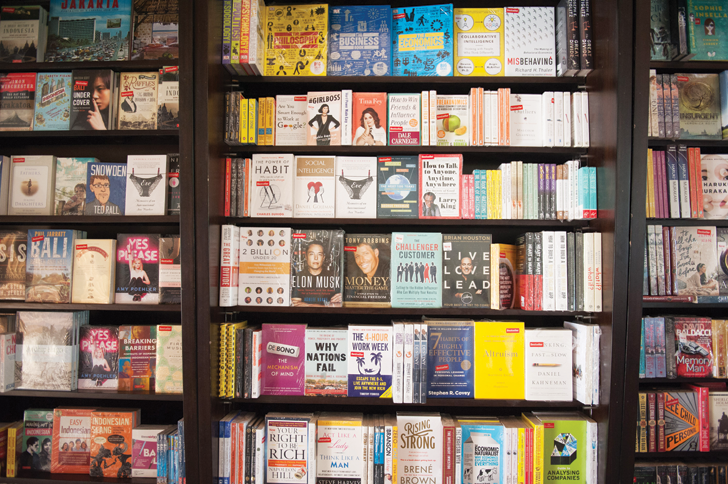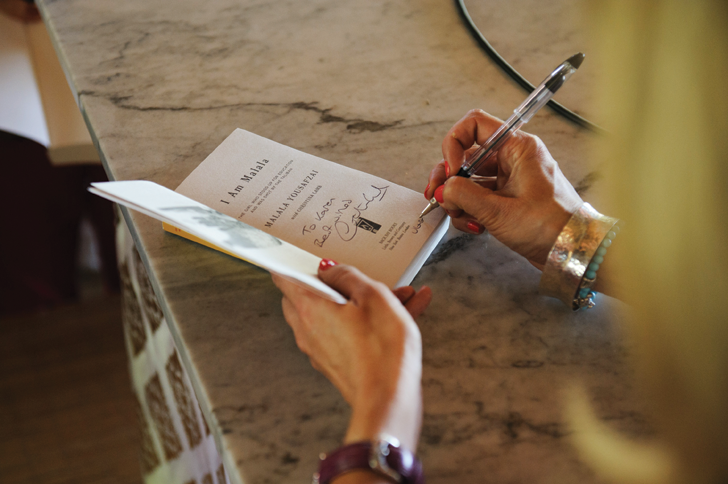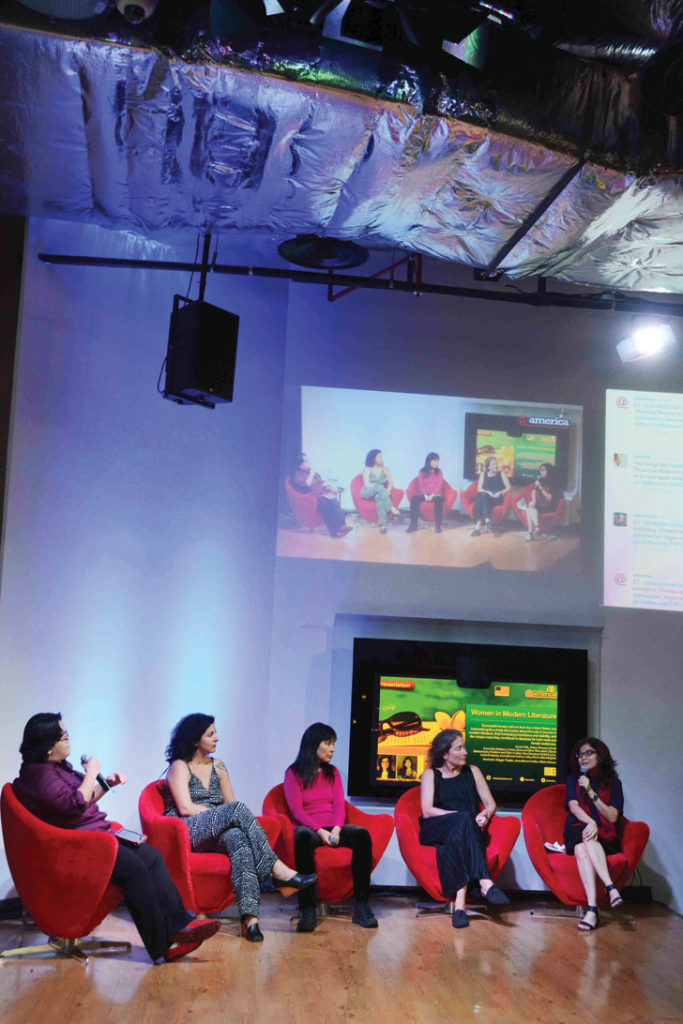Since its inception, the Ubud Writers and Readers Festival has organised satellite events in more than 25 Indonesian cities, from Aceh in the west to Ternate in the east. Australian writer and festival participant Antonia Hayes takes a look at this year’s literary gatherings across the archipelago
Indonesian writer M. Aan Mansyur pointed to the blue and ochre mural painted on the garden walls of Rumata Artspace in Makassar, South Sulawesi. “Makassar had our own Galileo,” he said. “Karaeng Pattingalloang was a local 17th-century intellectual who collected books from around the world and had the Dutch send him a telescope and world atlas. He even spoke seven languages.” Mansyur gestures to the mural’s title – the maritime-themed painting is called “Les Voyages: Knowledge and the Universe”.

South Sulawesi-born Mansyur is multilingual himself – his first language is the local Buginese, he is fluent in several Indonesian languages and he speaks Arabic and English. He explains how his linguistic diversity brings a conceptual richness to his own writing, that some ideas in one tongue simply cannot be translated into another and this gives his work imaginative complexity. Mansyur – who has published both novels and poetry – often thinks in Buginese, but writes and reads in Bahasa and English, and tells me that he has
a different personality in each language. With more than 700 living languages, in excess of 300 ethnic groups and 17,000 islands, the fact that many Indonesian writers often don’t write in their first language is impressive but not unusual. Most books published locally are written in Bahasa Indonesian.
Mansyur, along with local novelist Faisal Oddang, was a guest at an Ubud Writers and Readers Festival (UWRF) satellite programme event at Rumata Artspace, one of many that followed the main festival in Ubud, Bali, where more than 165 writers, artists and performers gathered from October 28 to November 1.
Censorship and freedom of artistic expression were key talking points after UWRF cancelled several planned events relating to the 1965 purge of Indonesian communists. Local authorities had threatened to revoke the festival’s operating permit if they went ahead. “It may have been the issue that we weren’t supposed to talk about, but the conversations that took place over the five days of the festival were strongly focused on 1965 and what we, as a creative community, can do to contribute to the type of world we want to live in,” said festival founder and director Janet DeNeefe.
While one aim of the satellite programme is to give local literary communities the opportunity to network with international writers and to offer Indonesian readers who cannot attend the festival a chance to hear from a diverse range of writers, these events are equally about amplifying Indonesian literary voices by bridging cultural and linguistic gaps. UWRF’s satellite programme is a real dialogue between the writers of Indonesia and the world, an intercultural exchange of stories and ideas.

Iranian-American novelist Porochista Khakpour visited the Indonesian capital, Jakarta, and Semarang on the island of Java. She said it was the young Indonesian writers who affected her the most: “Hearing and reading poetry – my first time reading my own in decades, as I’m a prose writer – in front of a bunch of very young local poets, on a gorgeous Jakarta hotel rooftop, with very sudden heavy rains, felt very blissful.”
Rebecca Harkins-Cross and Sam Cooney, both Australian writers and editors, travelled to Solo to participate in a panel event with local literary critic and essayist Bandung Mawardi, and then on to Yogyakarta, where they were joined by veteran writer Iman Budi Santosa. The breadth of knowledge and idiosyncratic approach of writers in Java made a lasting impression on both Australians.
“I was struck by the big questions Indonesian writers were tackling, around politics, social justice, education and spirituality,” Harkins-Cross said. “Local writers spoke philosophically about how the writer should live – questions that aren’t tackled that often at home.”
Cooney noted another difference between writers in Indonesia and his home country: while the Indonesian literary communities he encountered were vibrant and supportive, members also challenged and provoked one another. “There was a directness in both individuals and groups that is not so commonly found in Australian writing – directness from writers talking about their own work and career goals, and also a directness talking to each other,” he said. “It was refreshing to see such bluntness and honesty.”
“In Yogya,” Harkins-Cross said, “Iman Budi Santosa said that the city’s writing community was formed after 1965, born out of horror and struggle. Despite attempts at censorship at this year’s festival, various writers’ small acts of resistance were important and inspiring. The highlight of the festival was surely seeing how writers break open these silences and find strength in the shared noise.”
The pair was also impressed by the local literacy initiatives they encountered. “We visited Bandung Mawardi’s house in the countryside just outside Solo,” Harkins-Cross said. “He sees education as a large part of the literary critic’s role, especially in a country where literature is not currently mandatory in the national curriculum. In his front room he’s amassed a sizeable library – albeit a wonderfully haphazard one, with teetering piles of books everywhere in no discernible order – where each week he holds events including book clubs and discussions of pressing topics. I found this generosity, as well as the self-determined learning and sharing, incredibly inspiring.”

Back in Makassar, a similar grassroots generosity and an enthusiasm for making literature inclusive and accessible to everyone exists in the writers’ community. Rumata Artspace hopes to position the city as the new centre for arts and cultural events, a strategic cultural hub in the eastern part of Indonesia. Writers – and locally produced literature – in this city are thriving thanks to such nurturing, creative environments. In addition to hosting its own international writers’ festival, Makassar also has numerous community libraries and independent bookstores. Mansyur told me that he opened a public library, Kafe Baca Biblioholic, to ensure young people in Makassar have access to literature.
During the UWRF satellite event, Faisal Oddang spoke to the audience about writing his latest Bahasa-language novel Puya ke Puya. Oddang, who won the Asean Young Writers Award 2014, discussed using literature to comment on, and even criticise, aspects of contemporary Indonesian culture. Puya ke Puya is about the Tana Toraja indigenous community in Sulawesi, where Oddang stayed to research their culture for the book. One audience member asked why he chose to write some of his previous book in English and the crowd cheered – there is unmistakable pride in Indonesian culture and language – sparking a lively debate about not making linguistic compromises for the global market.
Language differences are often considered a barrier in the publishing world, but instead of obstructing exchanges between international and local writers and audience members, Indonesia’s linguistic diversity proves expansive and inspiring. The creative impulse, the drive to write and the exchange of knowledge are universal. Stories cross borders and transcend languages. In Indonesia, local writers across the archipelago are not only using literature to bridge gaps with the world, they’re also using words and stories to connect with each other and be heard – idea to idea, island to island.
In the same way that being multilingual brings a unique dimension to Mansyur’s writing, exposure to different ways of thinking and self-expression – not to mention stories that could only be told in the archipelago – brings an appreciation of Indonesia’s unique position in global literature. Harkins-Cross considers discovering “the incredible work being produced in that way you can only get on the ground” one of the highlights of the UWRF satellite programme. And with Indonesia featured as guest of honour at this year’s Frankfurt Book Fair, the rest of the globe will hopefully begin to discover more of the remarkable stories coming from these 17,000 islands of imagination.
Keep reading: Fixing a hole – From heroin-addicted sex worker to best-selling author, Kate Holden tells Southeast Asia Globe about fighting social misconceptions and the literary world’s double standards

